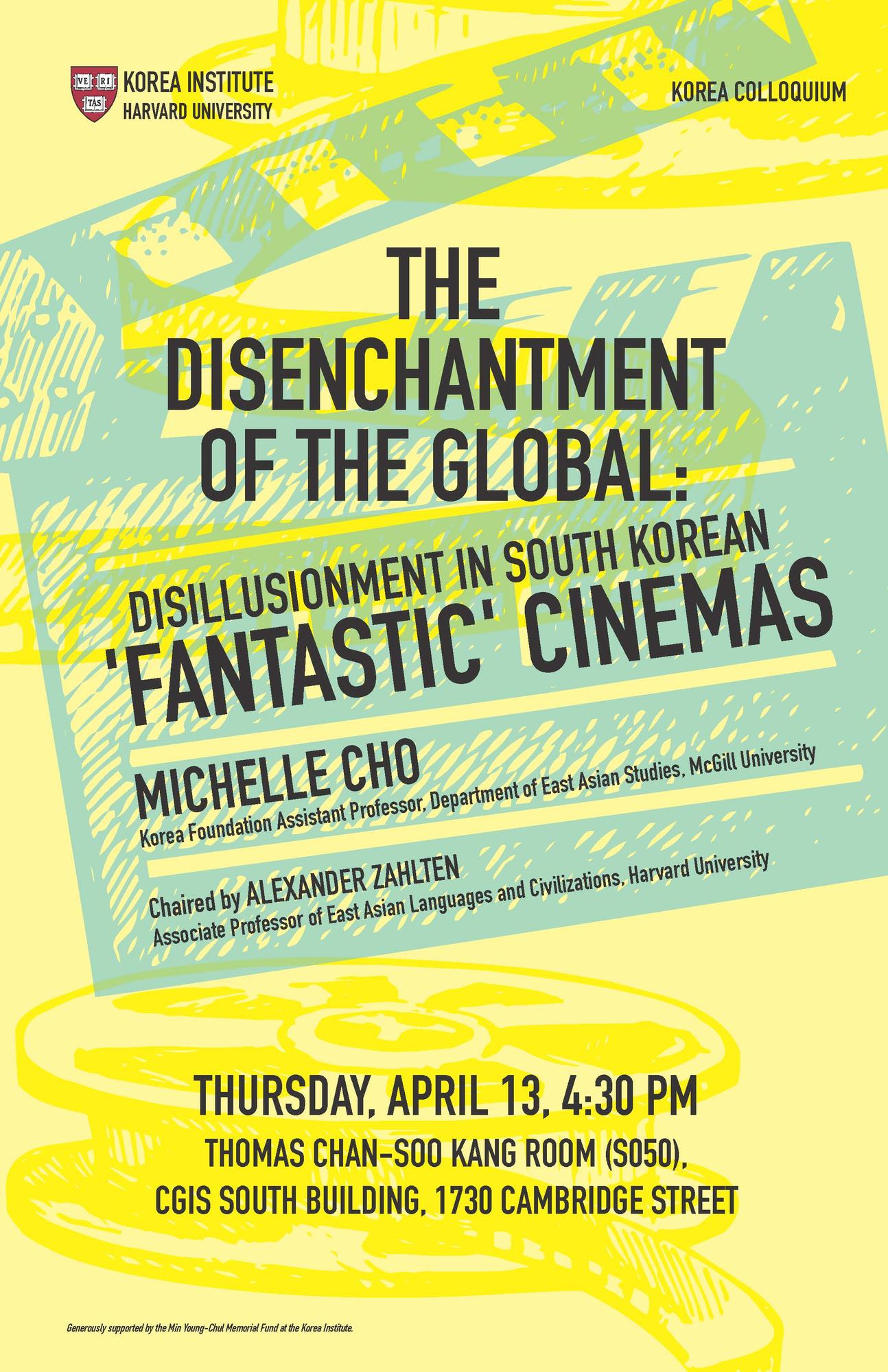Date:
Thursday, April 13, 2017, 4:30pm
Location:
Thomas Chan-Soo Kang Room (S050), CGIS South Building, 1730 Cambridge Street
Korea Colloquium

Michelle Cho
Korea Foundation Assistant Professor, Department of East Asian Studies, McGill University
Michelle Cho is the Korea Foundation Assistant Professor of East Asian Studies and World Cinemas at
Korea Foundation Assistant Professor, Department of East Asian Studies, McGill University
Michelle Cho is the Korea Foundation Assistant Professor of East Asian Studies and World Cinemas at
McGill University. Her research appears in Cinema Journal, Acta Koreana, The Korean Popular Culture
Reader, Hallyu 2.0: The Korean Wave in the Age of Social Media, and Simultaneous Worlds: Global
Science Fiction Cinemas. She is currently completing a book about contemporary South Korean genre
cinemas entitled Genre Worlds: The Politics of Form in Millennial South Korean Cinema, and her recent
work on Korean wave television, video, and pop music is forthcoming in Asian Video Cultures
(fall 2017, Duke) and the International Journal of Communication.
Chaired by Alexander Zahlten, Associate Professor of East Asian Languages and Civilizations,
Chaired by Alexander Zahlten, Associate Professor of East Asian Languages and Civilizations,
Harvard University
Abstract:
My presentation identifies a generic mode that I call the "disenchanted fantastic” in South Korean
Abstract:
My presentation identifies a generic mode that I call the "disenchanted fantastic” in South Korean
cinemas of the new millennium, as demonstrated in the satirical anti-humanism and horrific
disillusionment of I’m a Cyborg but that’s OK (Park Chan-wook, 2008), The Host (Bong Joon-ho, 2006),
A Tale of Two Sisters (Kim Jee-woon, 2003), and Bedevilled (Jang Chul-soo, 2010). These films stage
contemporary South Korean society as banally apocalyptic, and I argue that their overarching concern
is to visualize and thus work through multiple collective experiences of disenchantment: with the idealism
of 1980s populist democratic movement politics; with the teleology of modern urban development; and
with the kinship ideology that has been used to shore up authoritarianism and social inequality.
These films mount their critique of the fantasmatic structures of patriarchy and nationalism through their
juxtaposition of generic structures of feeling and the undecidability in characters’ experience
between fantasy and derealization. In this context, the "fantastic" does not serve primarily to
debunk the false value of appearances or the absolute opposition between fantasy and reality;
rather, in its disenchanted form, the fantastic demonstrates the eruption of the unknowable and
unaccountable amidst the architectonics of modern life. Against the horror vacui produced by
rapid modernization, the disenchanted fantastic ultimately recodes social bonds by figuring formlessness,
blankness, or emptiness as necessary preconditions for subjectivity and non-violent relationality.
Generously supported by the Min Young-Chul Memorial Fund at the Korea Institute. ??????
Generously supported by the Min Young-Chul Memorial Fund at the Korea Institute. ??????






